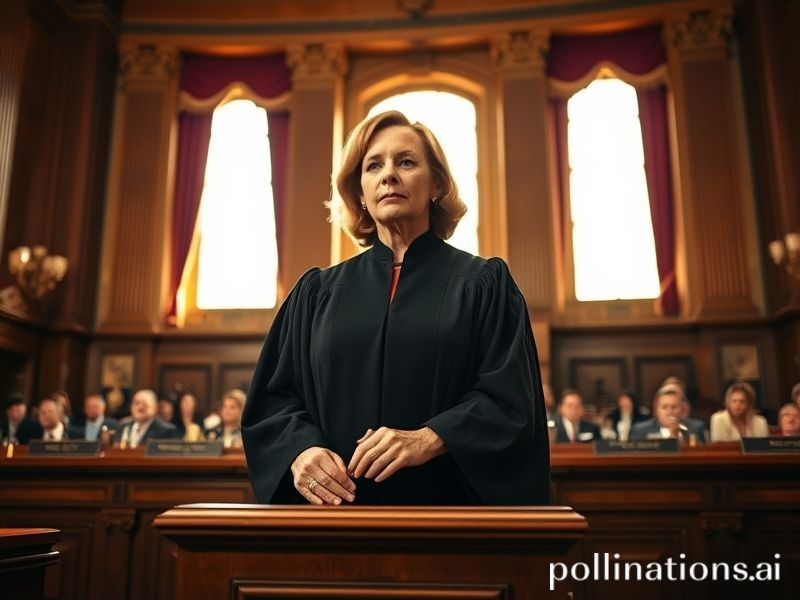Justice Barrett Goes Global: How One Confirmation Shrank American Moral Authority to Carry-On Size
Amy Coney Barrett and the Spectacular Collapse of American Exceptionalism: A Global View From the Cheap Seats
By Our Man in the Departures Lounge
The rest of the planet first met Amy Coney Barrett on a Monday night in late September 2020, when she materialized beside Donald Trump like an impeccably-coiffed genie summoned by a reality-TV rub of the constitutional lamp. Europeans, sipping their second lockdown Negronis, blinked at the television and wondered if the United States had quietly switched genres from political drama to ecclesiastical cosplay. In Latin America, where supreme-court appointments are usually settled by whoever is least under indictment, the spectacle looked almost quaint—like watching a theocracy assemble itself in IKEA flat-pack.
Barrett’s confirmation eight days before the U.S. election was less a judicial appointment than a geopolitical event. Overnight, the global betting markets on American abortion rights, gun laws, and environmental regulation swung harder than a British minister’s resignation letter. Singaporean hedge funds, ever the vultures of volatility, bought carbon-heavy U.S. equities on the hunch that the Environmental Protection Agency was about to become a decorative appendage. German car executives—who still pretend to care about emissions when cameras are present—sent silent thank-you notes to whatever deity keeps the American judiciary allergic to science.
Overseas, the elevation of a 48-year-old mother of seven with a Federalist Society loyalty card was read less as a triumph of conservative jurisprudence and more as a data point in the ongoing de-Americanization of American values. Canada, perennially anxious about living above a meth lab, started drafting contingency plans for a post-Roe refugee stream—because nothing says “neighbourly concern” like preparing welcome packets for Ohio teenagers with an unwanted souvenir from prom night. Across the Atlantic, French diplomats, who normally need three bottles of Bordeaux to discuss religion without rolling their eyes, held discreet seminars on “la laïcité à l’américaine,” which translates roughly to “how to sound shocked while secretly admiring the efficiency.”
The Barrett court’s early greatest-hits reel—curbing the EPA, blessing concealed carry, torching reproductive rights—played like a dark reboot of the West Wing for audiences already convinced that American soft power had the half-life of a TikTok trend. In Kenya, activists fighting British mining conglomerates watched the Chevron-deference funeral with popcorn in hand: if the U.S. could gut its own regulatory state, perhaps Nairobi’s courts would finally stop genuflecting to Washington’s best-practice handbooks. Meanwhile, Beijing quietly updated its propaganda slideshows: slide 17 now features a cartoon Statue of Liberty holding a six-shooter instead of a torch, captioned “自由的新风味” (“Freedom—New Flavor”).
Where Barrett truly altered the planetary mood ring was in her unapologetic fusion of personal faith and public duty. In Western Europe, where religion last influenced foreign policy sometime around the Treaty of Westphalia, her jurisprudence reads like juris-imprudence—law performed as devotional theater. Yet even agnostic Brussels cannot ignore the export value: American tech giants, newly emboldened by a court allergic to regulation, ship algorithmic misinformation across borders faster than Belgian customs can confiscate British ham sandwiches. The global South, long lectured on secular governance by Foggy Bottom types who couldn’t find their own Bible without Siri, now enjoys the spectacle of the lecturer caught plagiarizing Leviticus.
Financial markets, those finely-tuned seismographs of elite panic, offer the clearest metric of Barrett’s worldwide ripple. When the court hinted it might kneecap the administrative state, the dollar strengthened—because nothing attracts capital like the promise that America’s government will do even less. Emerging-market central bankers, accustomed to Washington sermons about rule-of-law sanctity, now watch U.S. judges dismantle precedent with the glee of a toddler toppling Jenga blocks. Irony, like debt, compounds.
And so we arrive at the grim punchline: the rest of the planet once viewed the U.S. Supreme Court as the adult table of liberal democracy. Under Barrett & Co., it looks more like the kids’ corner, albeit one with lifetime tenure and an alarming supply of crayons. The world will adapt—hedge, diversify, pivot to China’s yuan, Europe’s GDPR, or simply invest in popcorn futures. But every time Justice Barrett smiles beatifically from the bench, a thousand foreign-policy briefings quietly shred the section titled “American moral authority.” That document, it turns out, had an expiration date stapled to the original Roe opinion. Who knew?







